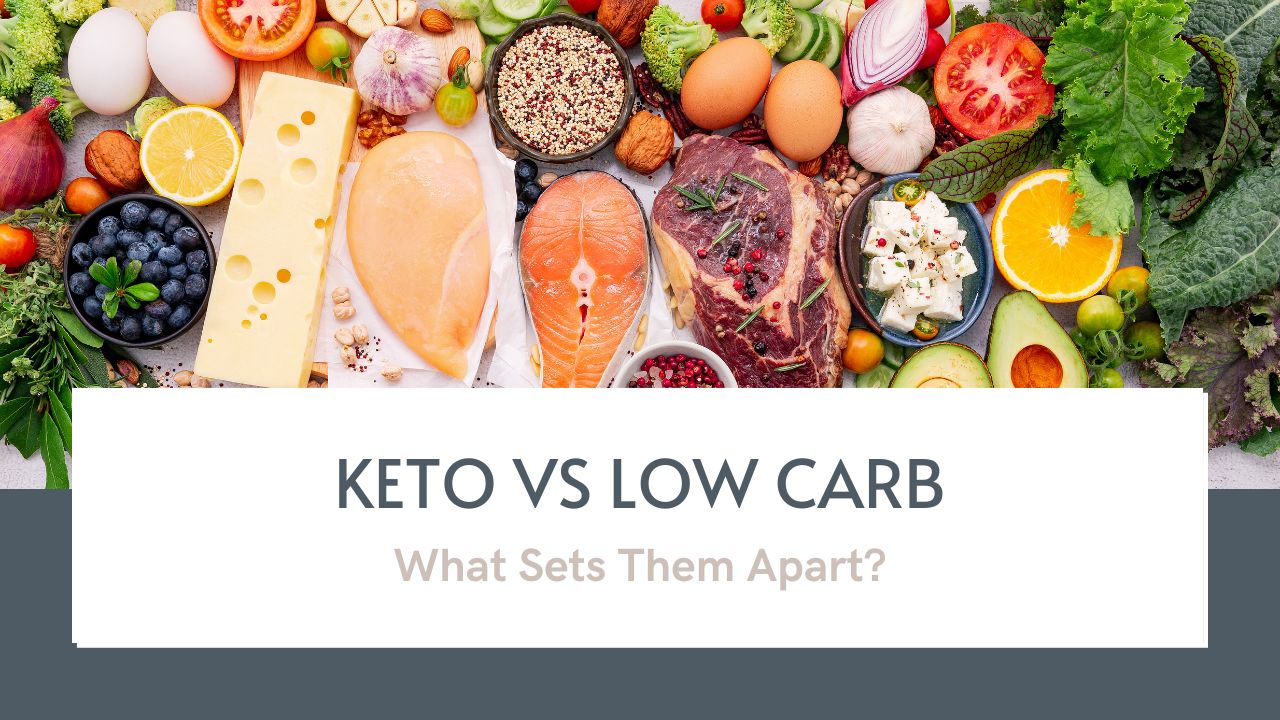Are you ready to start your weight loss journey? Confused between Keto vs Low Carb? Let’s find out what sets them apart.

With the increasing popularity of low-carb diets, it’s no wonder that many people are now curious about the differences between keto and low-carb. While both aim to reduce carbohydrate intake, there are distinct characteristics that set them apart.
In this blog, we will delve into the intricacies of the keto and low-carb diets. Let’s explore their similarities, differences, and the potential benefits of each.
Understanding the Basics: Keto vs Low Carb Diet
Let’s dive into the basics of the keto diet and low-carb diet, and what sets them apart.
The keto diet is a high-fat, low-carb eating plan that aims to shift your body into a state of ketosis. This metabolic state is achieved by drastically reducing your carbohydrate intake and increasing your fat consumption.
By doing so, your body is forced to burn fat for fuel instead of glucose. It results in weight loss and improved energy levels.
On the other hand, a low-carb diet is a broader term that encompasses various approaches, including the keto diet.
While both diets involve reducing carbohydrate intake, a low-carb diet allows for a higher range of carb consumption compared to the strict limits of the keto diet. Generally, on a low-carb diet, carbohydrates are limited to a certain percentage of your daily caloric intake, typically around 20-40%.
One of the key distinctions between the two diets lies in their focus on macronutrient ratios. The keto diet emphasizes a very high fat intake, typically around 75% of your daily calories, with moderate protein intake and minimal carbs.
In contrast, a low-carb diet is more flexible. It allows moderate intake of both fats and proteins, as long as carbohydrates are kept within the desired range.
Another important aspect to consider is the intended purpose of each diet. While both can aid in weight loss and improved metabolic health, the keto diet is known for its potential benefits in managing certain medical conditions, such as epilepsy and type 2 diabetes.
On the other hand, a low-carb diet is often chosen for overall health and sustainable weight management.
It’s worth noting that the keto diet can be more challenging to adhere to due to its strict limitations, such as avoiding most fruits, starchy vegetables, and grains.
In contrast, a low-carb diet offers more flexibility, allowing for a wider variety of food choices while still achieving the desired carbohydrate reduction.
How They Differ: Keto vs Low Carb
Understanding the differences between keto and low-carb can help you choose the right approach for your health and wellness goals.
Carbohydrate Restriction
One of the main differences between keto and low carb is the level of carbohydrate restriction.
In a keto diet, carbohydrates are severely limited, typically to around 20-50 grams per day. This is done to induce a state called ketosis, where the body burns fat for fuel instead of carbohydrates.
On the other hand, a low-carb diet allows for a slightly higher intake of carbohydrates, usually around 50-100 grams per day. This allows for more flexibility in food choices while still promoting weight loss and improved blood sugar control.
Macronutrient Composition
Another key difference lies in the macronutrient composition.
In a keto diet, the focus is on consuming high amounts of healthy fats, moderate amounts of protein, and minimal carbohydrates. This macronutrient ratio helps to keep blood sugar levels stable and promotes the production of ketones.
On the other hand, a low-carb diet typically emphasizes a balance of macronutrients, with a moderate intake of fats, proteins, and carbohydrates. The range of foods allowed on each diet also varies.
With the keto diet, there is an emphasis on consuming whole, unprocessed foods that are high in healthy fats and low in carbohydrates. This includes foods like avocados, nuts, seeds, fatty fish, and non-starchy vegetables.
In contrast, a low-carb diet allows for a wider variety of food choices, including some higher-carb options like fruits, whole grains, and legumes, as long as they are consumed in moderation.
One important aspect to consider is the potential for nutrient deficiencies. Due to the strict carbohydrate limitations in the keto diet, there is a risk of inadequate intake of certain vitamins and minerals, such as vitamin C and potassium.
This is why it is crucial for individuals following a keto diet to focus on nutrient-dense foods and potentially consider supplementation.
In a low-carb diet, while there is still a focus on whole foods, the slightly higher carbohydrate intake allows for a wider range of nutrient sources. It’s also worth noting that the keto diet is often used as a therapeutic intervention for specific health conditions, such as epilepsy or certain metabolic disorders.
Low-carb diets, on the other hand, are generally seen as a sustainable long-term approach to weight management and overall health improvement.
Pros and Cons: Keto vs Low Carb
1. Weight Loss Potential
Both the keto and low-carb diets have shown promise when it comes to weight loss. The ketogenic diet is known for its ability to induce a state of ketosis, where the body burns fat for fuel instead of carbohydrates. This can lead to rapid weight loss, especially in the initial stages.
On the other hand, low-carb diets restrict overall carbohydrate intake, which can also result in weight loss, although perhaps at a slightly slower pace.
2. Health Benefits
Both diets can offer various health benefits.
The keto diet has been associated with improved blood sugar control and insulin sensitivity, making it a viable option for individuals with diabetes or insulin resistance. Additionally, some studies suggest that it may have positive effects on heart health by reducing triglyceride levels and increasing HDL (good) cholesterol.
Low-carb diets, while less strict than keto, can still provide similar benefits, such as improved blood sugar regulation and weight management.
3. Sustainability
One consideration when choosing between keto and low carb is the long-term sustainability.
A Keto diet typically requires strict adherence to a very low carbohydrate intake, which can be challenging for some individuals to maintain over an extended period.
On the other hand, low-carb diets tend to be more flexible, allowing for a wider variety of food choices while still keeping carbohydrate consumption in check. This flexibility may make it easier for some people to stick with a low-carb approach in the long run.
4. Nutritional Balance
Another factor to consider is the overall nutritional balance of each diet. The ketogenic diet relies heavily on high-fat foods, which can lead to an increased intake of saturated fats.
While this can be beneficial for those looking to enter ketosis, it may not be suitable for everyone, particularly those with certain health conditions.
Low-carb diets, on the other hand, focus on reducing carbohydrate intake while still promoting a balanced intake of protein, healthy fats, and essential nutrients.
5. Adaptability
One advantage of the low-carb approach is its adaptability to different dietary preferences and lifestyles. It can be easily customized to accommodate various dietary restrictions or preferences, such as vegetarian or gluten-free.
Keto, on the other hand, may require more planning and adjustments to ensure a sufficient intake of fats and limited carbohydrates, which can be more challenging for some individuals.
6. Potential Drawbacks
While both diets have their benefits, it is essential to consider potential drawbacks as well.
The keto diet, due to its restrictive nature, may lead to nutrient deficiencies if not carefully planned. It can also cause adverse effects such as the keto flu during the initial transition period.
Low-carb diets, although more flexible, may still restrict certain food groups, potentially leading to nutrient imbalances if not properly managed.
Which One is Right for You: Keto vs Low Carb
When trying to determine which one is right for you, it’s important to consider several factors:
1. Health goals
Consider your specific health goals when deciding between keto and low carb. Keto is known for its ability to induce ketosis, a metabolic state where your body burns fat for fuel. This can be beneficial for weight loss and improving insulin sensitivity.
On the other hand, a low-carb diet focuses on reducing overall carbohydrate intake without necessarily reaching the state of ketosis. If your primary goal is to lose weight or improve insulin resistance, keto may be a better fit.
However, if you’re looking for a more sustainable long-term approach or have specific dietary restrictions, low-carb could be a suitable option.
2. Personal preferences
It’s essential to consider your personal preferences and lifestyle when choosing between keto and low carb.
Keto typically requires strict macronutrient tracking and a high fat intake, which may not be everyone’s cup of tea.
Low carb, on the other hand, offers more flexibility and can be customized based on the individual’s preferences and food choices. If you enjoy a wider variety of foods and prefer a less restrictive approach, low carb might be more suitable for you.
3. Sustainability
Sustainability is crucial when embarking on any diet. While keto can be highly effective for short-term weight loss or specific health conditions, some individuals find it challenging to maintain in the long run due to its strict requirements.
Low carb, on the other hand, offers more flexibility and can be adjusted to fit different lifestyles. Consider your ability to adhere to the chosen diet over the long term to ensure lasting success.
4. Overall health
It’s important to consider your overall health and any pre-existing medical conditions when selecting between keto and low carb.
If you have specific health concerns, such as cardiovascular issues or high cholesterol, it may be beneficial to consult with a healthcare professional before starting a keto diet, as it can have implications for certain individuals.
Low carb may be a more suitable option in such cases, as it allows for a broader range of nutrient-dense foods.
Ultimately, the decision between keto and low carb comes down to your individual goals, preferences, and health considerations. It’s advisable to consult with a registered dietitian or healthcare professional to determine the best approach for you and ensure that your chosen diet aligns with your specific needs and requirements.
Have you decided which diet is right for you?
When it comes to choosing between Keto vs Low Carb, it ultimately boils down to your individual goals and preferences. Both approaches have their unique benefits and considerations.
Whether you are aiming for rapid weight loss, improved metabolic health, or simply looking to adopt a sustainable and flexible dietary plan, understanding the key differences between Keto and Low Carb is crucial.
It is important to consult with a healthcare professional or nutritionist to determine which approach aligns best with your specific needs.
Remember, there is no one-size-fits-all solution, and what works for one person may not work for another. Embrace your journey to better health, armed with the knowledge to make an informed decision.
Do you want to explore other diet approaches? Check out these articles:


All this time, I thought they are the same. I’m glad I came across this post. Thank you for explaining everything.
You’re welcome, Belinda. Good luck on your weight loss journey.